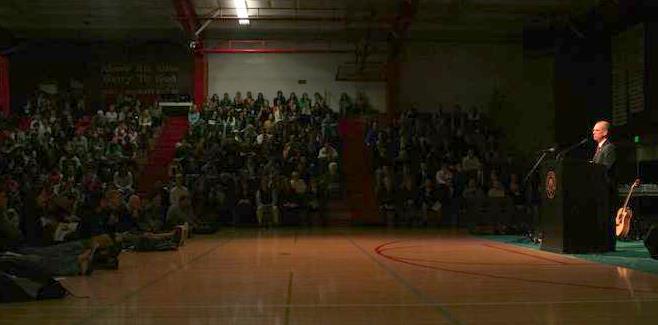Nearing its original target of one year, the Search Advisory Committee for Biola’s provost and senior vice president has yet to pinpoint ideal candidates.
The search firm hired to find candidates has contacted more than 100 people so far in Biola’s first-ever national search for a new chief academic officer, according to an update from President Corey earlier this month. Biola’s Search Advisory Committee, composed of university leaders, deans, faculty and staff, hopes to whittle down the list of the several most promising prospects and invite them to campus for official interviews in the next month or two. Some of the prospects have proved less than promising.
“It’s been surprising to me how a number of those people seem not to have a clue of what Biola is about,” said Bruce Narramore, the distinguished professor of psychology who co-chairs the committee alongside President Corey.
Corey and Narramore both emphasized that finding the right person for the job is more important than meeting a deadline. But Narramore didn’t minimize the importance of making timely decisions. In the meantime, Narramore said Interim Provost Patricia Pike is skilfully handling her duties after the resignation of 10-year provost Gary Miller last summer. As interim provost, Pike directly oversees the university’s deans and fills in for Corey in his absences, two of a provost’s weightiest duties. Corey, capable as he is, still needs someone to come alongside him and help run the university, Narramore said.
“Being a president of a university of this size, you cannot do everything,” he said.
The extensive nature of the criteria for the next provost and senior vice president narrows the list of prospects. An ideal candidate will think “on the same page” as Corey both spiritually and directionally for the school, Narramore said. Finding someone who grasps the integration of faith and learning has proved challenging, Narramore said. One highly qualified prospect, for example, was a strong Christian, but didn’t grasp the relationship of Christianity and academics.
Beyond that, the provost must be a strong administrator, have a clear vision for the school, lead and work well with people, listen actively and be flexible in response to future changes in higher education. The next provost can’t operate in “maintenance mode,” Narramore said. Narramore realized the rarity of someone who encompasses all the qualities listed in the online profile.
“It’s kind of like you need the second coming of Christ to have all of those,” Narramore said.
Finding a permanent, competent provost will free up President Corey to travel and fundraise around the globe.
“Our board hired Barry knowing that [fundraising] was a gift of his,” Narramore said. “But that also means you need a very strong provost.”
But Corey’s intent isn’t to shove all of his responsibilities to another, Narramore said.
“Barry is not a hands-off guy,” Narramore said. “… The provost and he will be working very very closely together.
Finding a permanent provost will also enable Corey to make trips for other reasons, like his trip to Asia in May to speak at a university and several local churches.
Whoever assumes Miller’s old post permanently will have big shoes to fill.
As provost, Miller oversaw the development of two degrees, as well as the Institution for Spiritual Formation and several extension sites. He was also instrumental in establishing the office for Diversity Leadership. Away from Biola, Miller also chaired a re-accreditation steering committee and made accreditation visits to other schools in the Western Association of Schools and Colleges. Miller took advantage of his times working with non-Christians to witness to them through both his deeds and words.
Corey and Narramore urged the community to pray in the midst of the decisive months to come.
“There is a sense that God will reveal a person who fits the opportunity profile and who also is an ideal colleague as Biola University moves forward,” Corey said in an e-mail update.







